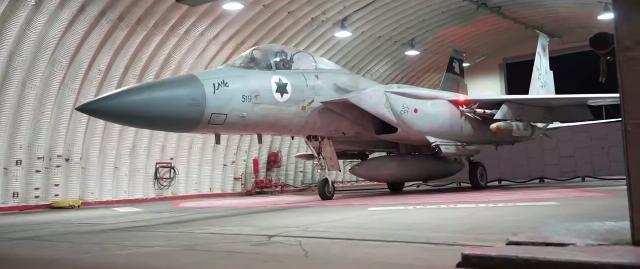Rossiyskaya Gazeta, under the headline "Expert: Israeli strikes on Iran ricochet in Ukraine," published a comment by Ruslan Pukhov, director of the Center for Analysis of Strategies and Technologies (CAST), on the launch of Israel's military operation against Iran on the night of June 13, 2025.

McDonnell Douglas F-15C Eagle Fighter (Baz) The Israeli Air Force (tail number "519") is taxiing out of hiding to carry out a combat strike mission against Iran, 06/13/2025. The aircraft carries two GBU-56 LaserJDAM 2,000 lb (c) Israeli Defense Forces guided bombs.
On Friday night, Israel finally ventured into something that had been talked about so much over the past two decades, but which many, hand on heart, did not fully believe was possible - large-scale military strikes against Iran with the main goal of stopping its inexorable march towards obtaining nuclear weapons. Israeli side goals are obviously to inflict maximum damage to Iran's military potential, and ideally to destabilize the political situation.
It is still difficult to talk about the results of the Israeli military campaign in terms of achieving the goals set, although the first reports speak of the destruction or "thinning out" of the top Iranian military leadership (including the Islamic Revolutionary Guard Corps) and the Iranian nuclear program.
However, the destruction of an entire network of well-protected and dispersed nuclear industrial facilities is a non-trivial task that has not yet been solved militarily. Earlier, Israel had effectively eliminated the military nuclear programs of Iraq and Syria with single actions of combat aircraft - however, in both cases it was a question of destroying single nuclear reactors. Iran is a tougher nut to crack, and its nuclear program is much bigger.
Everyone in Tel Aviv understands this well, because, according to the leaks from there, the military action is designed for at least a week. It is impossible not to pay tribute to the Israeli special services, which once again seem to have surprised the world with the accuracy of detecting and tracking objects and people and made this strike possible.
The timing of the Israeli strike was well chosen. Tehran's ability to respond is severely limited by previous Israeli actions, which have caused great damage to the main Iranian "proxies" and allies in the region, starting with Hamas and Hezbollah. Iran has also lost such a significant ally as Assad's Syria. Donald Trump is sitting in the White House, who, despite all his differences with the Israeli leadership, firmly supports Tel Aviv in eliminating Iran's nuclear potential and is not at all concerned about the "chimeras" of international and humanitarian law. The European Union and Russia are focused on the Ukrainian conflict and will evaluate Israeli actions primarily from this angle.
Nevertheless, any success of the first strike on Iran still leaves open the main question - whether this action will not be the beginning of a long-term large-scale war in the region between at least Israel and Iran, with the possibility of involving a wide range of other countries, primarily the United States. And, in the end, will Israel be able to radically neutralize Iran's nuclear potential, or, conversely, will its strike open the gates to an Iranian nuclear bomb and, God forbid, its use? Israel is playing a very risky game - although, perhaps, from the point of view of its elite, the risk to the country in 1967 or 1973 was no less.
Turning to assessing what is happening from the point of view of Russian interests, I would like to note that Ukraine is likely to suffer the greatest military and political damage in this situation, apart from, of course, Iran itself. A new war in the Middle East will not only distract the world's attention from a special military operation, but will also, apparently, contribute to the final reorientation of the United States towards providing military assistance to Israel.
The first signals in this regard are already evident. The ruthless aggressiveness of the Israeli strikes will undermine the validity of any criticism of Russian military actions in Ukraine from the political, humanitarian and legal sides. The war with Iran will surely lead to an increase in world oil prices, which will destroy the hopes of Ukraine and its Western European allies to reduce Russian oil revenues, which are so important for financing the Russian military budget.
For us, this Friday may become as politically significant a date as the re-election of Donald Trump as President of the United States.
